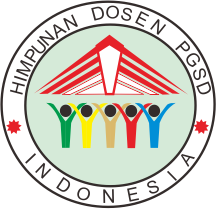MOTIVASI MAHASISWA MEMILIH PROGRAM STUDI PGSD
DOI:
https://doi.org/10.30595/dinamika.v7i2.927Keywords:
motivation, students, Primary Education Study ProgramAbstract
Motivation is one of success important determinants. Motivation is divided into two, they are intrinsic motivation and extrinsic motivation. The purpose of this study was to determine the students’ motivation in choosing primary education study program (PGSD). This study was descriptive research in the form of a survey. It investigated the circumstances, conditions, and other factors whose results are presented in the form of a report. The population in this study were PGSD students of Ahmad Dahlan University, academic year 2013/2014 class A, B, C, D, E, F consisting of 245 students. This research used questionnaire sheets to gather data. The data was then analyzed using descriptive statistics. The results show that PGSD students vary in motivation. Intrinsic motivation that affects students joining PGSD varies from the desire to be elementary school teachers, civil servants, and private course owners. On the other hands, students also vary in terms of extrinsic motivation, for example, following the wishes of their parents, following PGSD trend, expecting high salaries, being not accepted in the previously desired study program, and joining friends. The results also show that the highest percentage of students’ intrinsic motivation in joining PGSD is because they do want to be primary school teachers, while in extrinsic motivation was because they follow the wishes of their parentsReferences
Agoes Dariyo. (2004). “Pengetahuan Tentang Penelitian dan Motivasi Belajar pada Mahasiswa”. Jurnal Psikologi, Vol. 2 No. 1, hal. 45.
A.M. Sardiman. (2007). Interaksi dan Motivasi Belajar Mengajar. Jakarta: PT. Raja Grafindo Persada.
Arifin dan Barnawi. (2012). Etika dan Profesi Kependidikan.Yogyakarta: Ar-rruz Media.
Dimyati dan Mudjiono. (2009). Belajar dan Pembelajaran. Jakarta: PT Rineka Cipta
Elliott. (2010). Educational Psycology Effective Teaching, Effective learning. New York: Mc. Grawl Hill
H. Djaali. (2008). Psikologi Pendidikan. Jakarta: PT. Bumi Aksara.
_______. (2009). Psikologi Pendidikan. Jakarta: PT. Bumi Aksara.
Hamzah B. Uno (2008). Teori Motivasi & Pengukuranya. Jakarta: PT Bumi Aksara.
Hasibuan, Malayu S.P. (2006). Manajemen Sumber Daya Manusia. Jakarta: Bumi Aksara.
McLea, Alan. (2009). Motivating Every Learne. Chennai: FSC.
Ngalim Purwanto. (2006). Psikologi Pendidikan. Bandung: Rosdakarya
Oemar Hamalik. (2004). Psikologi Belajar dan Mengajar. Bandung: Sinar Baru
Rao, S.N. (2002). Educational Psychology. New Delhi: New Age International (P) Limited, Publisher.
Sharma, P.L. (2005). Motivation for Learning. Delhi: Prabhat Kumar Sharma for Sarup & Sons.
Siagian, Sondang P.. 2006. Manajemen Sumber Daya Manusia. Jakarta: PT. Bumi Aksara.
Suharsimi Arikunto. (2010). Prosedur Penelitian Suatu Pendekatan Praktik. Jakarta: Rineka Cipta.
Undang - Undang No. 14 tahun 2005 tentang Guru dan Dosen
Zuldafrial. (2012). Strategi Belajar Mengajar. Surakarta: Cakrawala Media.
Downloads
How to Cite
Issue
Section
License
Authors who publish with this journal agree to the following terms:
Authors retain copyright and grant the journal right of first publication with the work simultaneously licensed under a Creative Commons Attribution License that allows others to share the work with an acknowledgement of the work's authorship and initial publication in this journal.
Authors are able to enter into separate, additional contractual arrangements for the non-exclusive distribution of the journal's published version of the work (e.g., post it to an institutional repository or publish it in a book), with an acknowledgement of its initial publication in this journal.
Authors are permitted and encouraged to post their work online (e.g., in institutional repositories or on their website) prior to and during the submission process, as it can lead to productive exchanges, as well as earlier and greater citation of published work (See The Effect of Open Access).

Dinamika Jurnal Ilmiah Pendidikan Dasar is licensed under a Creative Commons Attribution 4.0 International License.













